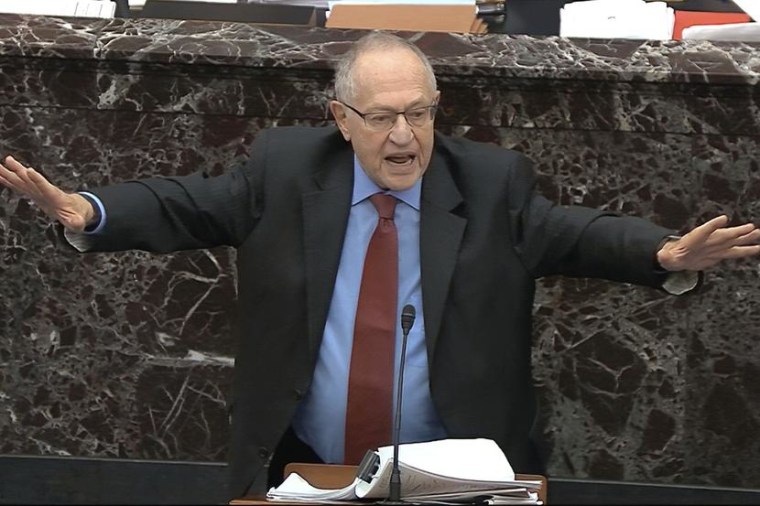I naively thought Alan Dershowitz had gone about as far as he could go in Donald Trump's impeachment trial when he argued that Donald Trump can't be convicted, even if he's guilty, because presidential abuses of power are permissible. Little did I know the argument he'd present on the Senate floor today.
Alan Dershowitz argued that a quid pro quo involving a president's political benefit was fine because all presidents believe their elections are in the public's interest.
Essentially, if Trump withheld nearly $400 million in aid to pressure Ukraine into announcing investigations of Democrats to help his campaign, that's fine because Trump thinks his election is to the country's benefit.
"If a president does something which he believes will help him get elected in the public interest, that cannot be the kind of quid pro quo that results in impeachment," he said.
Let's pause to follow the logic. As Dershowitz sees it, a president can't be impeached if he or she is acting in the public interest. A president also has the authority to pursue a foreign policy in the public interest. And finally, a president also believes his or her re-election is in the public interest.
Ergo, Donald Trump has the authority to use foreign policy to advance his re-election prospects -- and that should be seen as entirely permissible in our system of government. It's not corrupt, Dershowitz asserted, so long as the Republican believes the country would be better off with him in office.
It's an argument rooted in the belief that Trump may very well have tried to coerce a vulnerable ally into helping his campaign, though Dershowitz believes there's nothing wrong with that because Trump also believe his re-election would benefit the public.
The problem, beyond the apparent fact that this is crazypants bonkers, is how such a position could be applied in the real world.
Evidently, for example, a president could use this perspective to ignore Congress and federal law, endanger a foreign ally, and undermine U.S. national security interests. But what else? Could a president order the FBI to harass those who stand in his way? Could he arrest his opponent under the auspices that it's "in the public interest"?
Could he or she dish out pardons in exchange for campaign contributions? Could he or she launch a war for made-up reasons? Could he or she transfer public funds from the Treasury to his or her re-election coffers?
By Dershowitz's reasoning, the answer to each of these questions appears to be, "Yes."
The next question is whether Senate Republicans, en masse, are prepared to go along with such a proposition, or whether they'll say this is a bridge too far. I have a hunch they'll choose the former over the latter.
Indeed, several GOP senators have already effectively answered the question, insisting yesterday that they're indifferent to presidential abuses of power.
MORE: Today's Maddowblog

